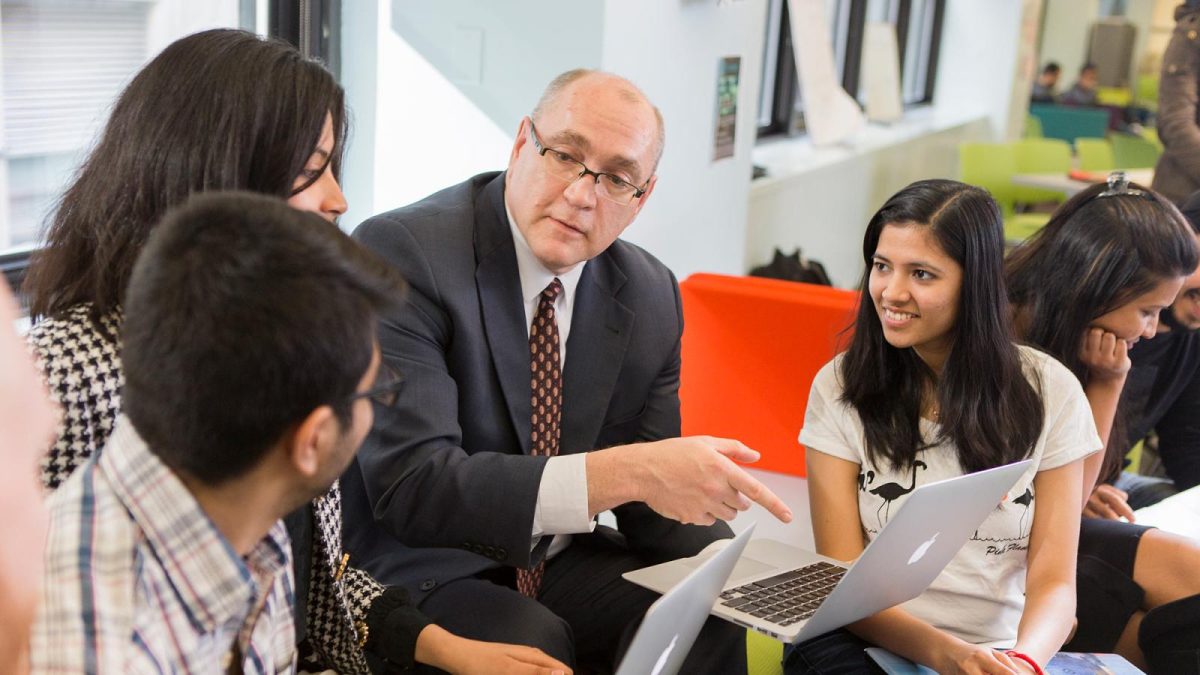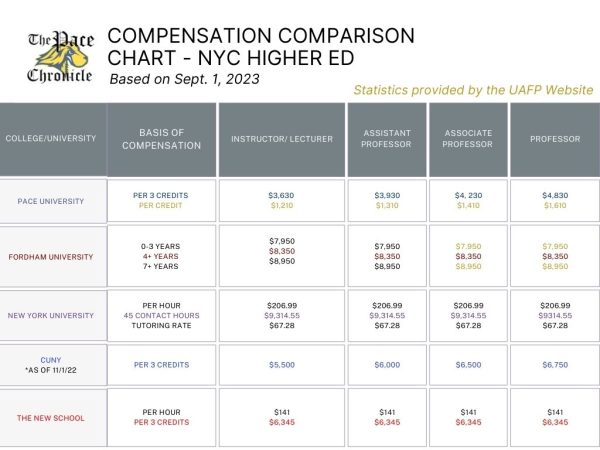Please note that this is a developing story – things may change or have changed by the time this is published, we will continue to provide updates as more information becomes available.
The fall semester begins on an uncertain note for an estimated 63 percent of faculty working without a new contract. The Union of Adjunct Faculty at Pace says its members are grossly underpaid. If the union were to strike, it would cause a massive disruption to students’ classes. Look at your fall schedule: do you know how many of your courses are taught by adjuncts?
According to the UAFP’s website, Pace adjuncts are currently being paid $3,630-$4,830 per three-credit course. According to the UAFP, that is far below rates at similar universities, such as Fordham University, The City University of New York (CUNY), and The New School. Fordham, for example, pays adjunct professors $7,950-$8,950 per three-credit course, according to the UAFP’s website.
From this analysis, the Union says, it becomes clear Pace is under-compensating their adjunct faculty.
The UAFP’s last contract expired in June, but it agreed to an extension until September 3. Negotiations with the university over the summer, however, remain ongoing despite the approaching deadline of the extension. If the September 3 deadline passes without a new agreement, adjunct professors could keep working under the terms of their current contract. However, they could vote to strike.
The Pace Press reported in April that criticism related to adjunct compensation is not new and is a problem throughout higher education.
What is collective bargaining?
A collective bargaining unit is a group of employees with similar job responsibilities represented by a union. Throughout collective bargaining, a unit works with an employer to negotiate a Collective Bargaining Agreement or CBA. A CBA is renegotiated every three years and outlines elements related to job security and compensation. Specifically, the CBA for Pace’s adjunct professors for the July 1st, 2021 – June 30th, 2024, term outlines agreements on conditions like per credit salary increases, credit limits, course evaluations, training pay, and income replacement terms.
According to their website, the Union of Adjunct Faculty at Pace represents a collective bargaining unit of about 900 adjunct faculty members. As the Pace Press has reported, adjunct faculty are a large part of Pace’s education landscape. Not only do adjuncts outnumber full-time faculty (822 to 479) but the percentage of adjunct faculty (63%) is also 11.6% above the national average. However, the retention rate of adjunct faculty at Pace is lower. The union has suggested this is a result of the lower compensation that adjunct faculty at Pace University receive.
Who are adjunct faculty?
Full-time faculty members are guaranteed classes to teach each semester and usually have secured benefits with their positions. Adjunct faculty are not guaranteed to have classes to teach each semester and are often paid by the number of credit hours they teach. The benefits adjunct faculty members receive can depend on the university they teach at, the credentials or titles they hold, or the amount of time they have been in their position. Some adjunct faculty work multiple jobs to provide for themselves and their families due to the benefit and income insecurity but this is not the case with all adjunct faculty.
State of Current Negotiations:
The negotiation room consists of the Union President, Vice President, Treasurer, and Secretary, along with their lawyer and a federal negotiator who acts as a third-party communicator between the University and Union teams.
Beth Roberts is the Secretary for the Union of Adjunct Faculty at Pace. She has been at Pace since 2013, and this is her third year as Secretary. Roberts said that adjuncts are looking for equitable pay, not just consistent raises, and noted that the Union came to the table with a list of proposals. She said they have been bargaining in good faith with the University, which she said has taken time to “wake up” to the union’s demands. She said the union particularly wants a contract that would help Pace keep adjunct faculty longer.
On Friday, August 16th, Roberts said there was a rally held on the NYC campus with around 25-30 people attending, largely Dyson College and Sands College faculty. Roberts said they planned to hold rallies between September 12th and 19th to talk to members.
An email Pace sent to faculty on August 22 showed the university’s most recent offer includes increases for three years of 11.5% in the first year, 7% in the second year, and 7% in the third year of the agreement. This compounds to 28.5% over the three-year contract.
Roberts said Pace indicated this was its best and final offer, which she believes was premature, with two more weeks remaining in the negotiation period.
Roberts said she was not able to go into the specifics of the offer. However, she also said the Union’s team refused to meet with the University and did not engage with the offer as per the advice of their attorney.
Roberts said she is still hopeful that an agreement between the UAFP and the University will be reached.
What is the University’s perspective?
Jerry McKinstry, Assistant Vice President for Public Affairs in Westchester, shared the following statement on behalf of the university when asked for updates on the current negotiation process and how failure to reach an agreement may impact the student and faculty communities on Pace’s campus:
“Adjunct faculty are an important part of the Pace community, and we deeply value them and their work. Pace University has and will continue to negotiate in good faith with our adjunct faculty to reach a fair and financially sustainable agreement.”
Provost Joseph Franco had been leading negotiations for the university this summer. However, an email from President Marvin Krislov to the Pace community on July 30 announced Franco would step down from his position for personal reasons. When asked if there was any correlation between Provost Franco stepping down and the ongoing contract negotiations, McKinstry referred us to that email, which also stated that Franco would “continue to contribute to the Pace Community as a Senior Advisor to the Provost.”
The email also said that effective August 16th, Dean Jonathan Hill of the Seidenberg School of Computer Science and Information Systems would assume the responsibilities of Interim Provost. Further, more information on the interim Dean of the Sieidenburg school will be “coming out at a later date” along with more information relating to the search for Pace’s next Provost.
In coverage from the Pace Press article from April, UAFP President Bill Quinlan and Secretary Beth Roberts said they felt optimistic about the negotiation efforts starting this year. They said Franco was a leading reason why he made them feel they were being heard.
More recently, Roberts also told the Pace Chronicle that she thinks the presence of the federal mediator and Franco has been helpful.
What to know about past negotiations:
The Pace Press notes the University and the Union reached their first contract agreement in March 2009 after 54 sessions of negotiations. Another year of negotiations saw 20 sessions, and the next 21 sessions with a federal mediator. In 2021, the union reported that negotiations only lasted for 6 sessions before reaching an agreement.
Varise Cooper, a former adjunct at Pace and the former Vice President of the UAFP, said some union members wanted to call for a strike in 2021. “We realized that what the institution was offering us was not enough, which is why we should have had a strike back then,” Cooper said. “But we didn’t have a strike for two reasons: one, because of COVID, and two, because of the advanced years of the president and also the treasurer who did not have the desire to exert the energy that was necessary to do so, to actually organize a strike.”
Cooper said the last contract disproportionately benefited adjuncts who had been working at Pace longer, such as the union’s leaders.
“So they decided to accept what was being offered, because it benefited them, being senior members of the staff, and they were getting the most benefit,” he said.
Cooper said in 2021, he insisted on an early start to negotiations so that they could finish them before their contract ended. Although he is not part of the union anymore, Cooper attributed this year’s lengthy negotiations to poor leadership.
“I would say that Pace isn’t operating in good faith and the leadership of the union is probably not strong enough to do it, which leaves the students in a precarious position because they’re getting poor services,” he said.
Roberts said this year’s negotiations began at the end of March. She said the unit teams did not meet in May and July due to various absences, but she said lawyers were continuing to meet during those months to come up with various options and proposals.
What to know about a potential strike:
Roberts said a strike is not the immediate next step. She stressed that many bridges must be crossed before a strike is considered a course of action.
Roberts said she is prepared to teach in the fall, even with the possibility of having to do so out of contract, while negotiations continue. She added that other adjunct faculty are also “prepared to teach – it’s their passion and it’s what they are here to do.” Roberts also noted that adjuncts could teach out of contract, though she hopes an agreement can be reached and presented to the UAFP’s membership.
Roberts said once the Union and the University come to an agreement, the UAFP must show it to its members who vote on whether or not to accept the contract. If the presented agreement passes the membership’s vote then it is ratified by the Executive Board and taken into action – she noted Pace’s Board of Trustees also looks at it.
In the case they are unable to form an agreement, or the membership votes no, then they go back to the negotiating table. It is in this case where faculty may be prepared to strike but, Roberts explained, that organizing a strike or job actions takes time, as the Union must hold a vote where its membership decides to go on strike.
In a letter published on their website in October 2023, the UAFP said they have “substantial funding” in a strike fund to support the membership in its bargaining and provide a stipend to faculty members if a strike is needed.
The UAFP continued in the letter that, “If University management chooses to drag out negotiations and fails to negotiate parity of economics with other neighboring Universities such as Fordham, a job action and strike may be required to apply the needed pressure to obtain such economic parity.”
Such action would not be uncommon: at universities that negotiated higher compensation contracts, striking was used by some of the schools to reach an agreement. According to the UAFP’s letter, the Universities that did experience strikes (The New School and Rutgers) had strikes that ranged from days to weeks. Rutgers went on a five-day strike and The New School’s went on for three weeks. However, the letter also notes that Fordham, CUNY, and New York University (NYU) were able to settle without a strike.
So, what happens now?
The results of these negotiations may affect the experiences students and faculty have in the classroom. If the two sides are unable to reach an agreement, and faculty members strike, students may face a larger learning curve and faculty may have to take on a larger workload.
However, the University and the Union continue to keep negotiating and presenting offers, keeping in mind the September 3rd deadline.


